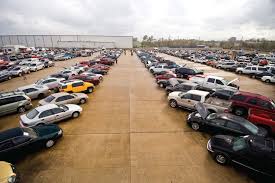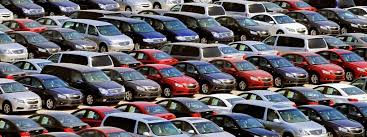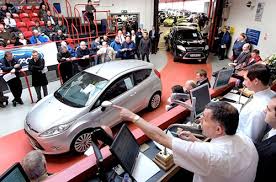Why do dealers send cars to auctions?
There might be a few reasons that a dealership sends a vehicle to auction, but the main one tends to cost.
Audience: Dealerships will take vehicles in on trade to make a sale and for the convenience of the customer. They will usually do this a way below market value so they cover the costs of having to repair it and sell it themselves, or they have already anticipated selling it at auction. If the vehicle is older or in worse shape, and doesn’t “fit” the existing inventory, then sending it to auction is the easiest and quickest way of getting rid of it. Auction tend to be accessible across the entire country and are frequented by other dealerships as well. The audience is significantly higher.
Liability: Most jurisdictions have regulatory bodies as well that govern dealerships and the rules they must follow when selling vehicles to the general public. And they might stipulate that vehicles cannot be sold “As is” without disclosing any and all problems. It is honestly impossible to know every single little thing wrong with older vehicles, so if you sell it directly to the public, it opens you up to liability. Furthermore, even you manage to disclose everything, someone purchasing such a vehicle might still come back and file a complaint against you, which wastes time and money, forcing you to reverse the sale.
If you send a vehicle to auction, especially older models, the liability is now minimal to you. Although you still have to disclose major problems and the auctions houses do perform inspections, you can list older vehicles as “Red Flag”, meaning that the vehicle is being sold As Is and the buyer has zero course of action.
Cost: Most dealerships in North America purchase their inventory (new or used) with borrowed money. Instead of borrowing a lump sum, they actually take loans on individual and specific vehicles. And although terms vary significantly, usually the dealership will not have to pay interest on a vehicle for the first 30 days, for example. But if the vehicle sits on their lot too long or they have excess inventory, then the lender starts charging interest and penalties on a daily basis.
So those vehicles literally bleed money for the dealership and it is more cost effective to off-load inventory quickly and below market.

What Happens to Used Cars Not Sold By Dealerships?
So, what happens to these ‘unwanted’ vehicles? Is there a place where you can get your hands on them and save more in the process? Let’s explore.
Cutting the Cost and Sending Them Out
When a used car dealership is having trouble selling a particular used vehicle, the same thing always happens. The longer that the car sits on the lot, the lower the price will go. Necessarily, this will mean it’s wise to bide your time when you’re looking to buy a used car through a dealership.
Selling at Dealer Auctions
Used car dealerships use dealer auctions for two purposes. They use them to purchase vehicles to stock their lots, and they use them to get rid of vehicles that aren’t selling. Necessarily then, these dealer auctions are a good place to look if you’re searching for a used car at a steep discount.
Gaining Access to Dealer Auctions
However, there’s one big problem with these dealer auctions as far as ordinary consumers are concerned. For the most part, these auctions are closed to the public, as dealers do not want to open up these possible savings to consumers, thereby cutting into their bottom lines. However, it is still possible to participate. You can, for example, pay an auction broker to bid in these auctions on your behalf. But, there’s a much cheaper way to gain access to these used cars than that!
Use Online Car Auctions to Buy Used Cars
In recent years, some online car auction websites have cropped up that grant access to these dealer auctions online. Through them, it’s possible to locate and bid on used cars auctioned off by used car dealerships. This is great news for consumers. It allows them to bid on and win vehicles without having to pay a used car dealership’s markup.

Why Are Cars Auctioned? Are Auction Cars Worth the Risk?
There is a variety of reasons why cars end up at auction houses. Some of them are:
- Some cars have stayed too long at the dealer’s lot, so they are auctioned off as an alternative option to recoup some of the money invested.
- The original owners cannot meet up with their payments, so they’re repossessed and auctioned off by financial institutions to recover their money.
- Some cars get to the auction house because they are being traded for a new one. In this case, private car owners exchange their old cars to get another car in return.
- Some cars have suffered damage from weather conditions or accidents. After paying off the owners, the insurance companies want to recoup some of what they paid out. Due to the damage history, these cars can only be sold at specialised auctions. The damages could include scratches, dents, or malfunctions as a result of thickened car fluids caused by winter.

What Dealers do With Your Trade-In
Knowing what happens to your car after you trade it in at a dealership can help you get top dollar for it.
There are certain types of cars dealers absolutely love to buy and some they hate. You have to remember dealerships make a good bulk of their profit through the sale of used cars. They actually make more profit on each used car sale than they do on a new car. So that means they’re usually eager to buy your trade-in and replenish their used car inventory.
Generally, there are 3 things that dealers can do with your trade-in.
1. Recondition and Sell It
Dealers are always looking for cars they can sell on their lot – but not every car will qualify.
If your vehicle is less than 6 years old and has less than 80,000 miles, it’s a good candidate to be resold on the lot. The dealer will recondition it to make sure all the visibilly worn parts are repaired or replaced and that it passes smog tests and any other state requirements.
The vehicle will usually be listed for 15 to 20% above its trade-in value.
If the car is only 3 or 4 years old and has less than 50,000 miles, it’s a good candidate to be resold as a certified used vehicle. It will go through a strict multi-point inspection and usually come with an extended warranty. The price premium will add another $1,000 to $1,500 to the retail price.
Dealers simply LOVE late model used cars, so if you have one, make sure you aggressively negotiate with multiple dealers to get the best price.
2. Wholesale It
If a dealer doesn’t think the car is a good fit for their used car lot, they will usually try to wholesale it to another dealer. This usually happens if the vehicle is older or has a lot of miles, or if the car is a different brand than what the dealer sells. For example, if you trade-in a Honda at a Mercedes dealership, they’re more likely to wholesale it to a Honda dealer down the road – or sell it to an independent used car lot.
Whenever you’re thinking about trading-in your vehicle, make sure you take it to the same brand of dealership. If it’s a much older vehicle, consider selling it to an independent used car lot so you cut out the middle man. A car dealer usually doesn’t make much profit when wholesaling a vehicle, so they will try to low-ball you as much as possible when you trade-in your car.
3. Auction It
For the really undesirable vehicles (usually ones that are very old, have high mileage, or are in poor condition), dealers will send them through auctions. This happens if the dealer can’t find anyone to wholesale it to in their local market. Auctions usually result in the smallest profit for dealers, so if you have a car that nobody wants, don’t expect to get much for it by trading it in. It’s much better to try to sell it yourself to a private party.
Dealers will almost always bid for your trade-in, even if they know they will have to auction it off. Making a couple of hundred dollars is better than nothing, but they will try to give you a very low-ball offer for your vehicle.
Types of Auctions
Closed or Private Auctions
These auctions are called private because they are usually accessible only by licensed car dealers and not by the public. This is the type of auto auction where some of your local car dealers come to buy the cars they sell.
Public Auction
These are popular and happen frequently. These auctions are usually organized by insurance companies and car auction houses. The idea behind the auction is to sell used cars that may have been repossessed, just used with little or no issues, rebuilt from damage or used by insurance companies to recoup the money.
Government Auctions
These auto auctions are organized by the US customs service or some other government body. These auctions are organized to sell off old or excess vehicles including cars, trucks, bikes and so on that may have been impounded or seized. In some cases, like police auctions and government agencies, they sell them off to dispose of their old cars when they replace or overhaul their fleet of vehicles.
Online Auctions
This kind of auto auction is now very popular as it is one of the most convenient ways to buy a car without the need to be present or even be in the country where the car is located. At online auctions, mostly used cars are put up for sale, and prospective buyers register on their sites to join the auction. They rely on the information granted by the site to choose a car to buy.